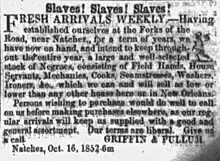
Griffin & Pullum, later Griffin, Pullum & Co., was a 19th-century American interstate slave-trading company. The principals were Pierce Griffin and William A. Pullum. They mainly bought people in Kentucky and sold them in Mississippi.
According to J. Winston Coleman in Slavery Times in Kentucky, Pierce Griffin was selling in Natchez as early as 1833, and "from the tax returns of that year, which represented one per cent of the gross sales of all 'transient merchants' and 'vendors of slaves,' it appears that Griffin sold over six thousand dollars' worth of slaves".[1]
In May 1902, historian Frederic Bancroft interviewed a man named Alfred Wornell, who had been trafficked to Natchez from Lexington, Kentucky by Pullum, likely in the late 1840s. Wornell said:
Den Billy Pullum bought me. Him an' Pierce Griffin was niggah-tradahs, an' put me in his jail in Lexin'ton. Pullum brought me down t' Griffin's yahd at de Forks o' de Road...Sixty-three hade [head] of us walked. Dere was two wagons an' a amb 'lance. Here was only one little chile; de res' was men an' women. De oldes' man was 'bout 45 and de women 'bout 15 to 25. Dey give us meat an' bread an' coffee. Dere was plenty of it while we was comin'. We started 'fore day an' traveled till three o'clock in de ev'nin. We stopped some days to res' up...Fettahs was kep' on my ankles for a week er two 'cause I had run away."[2]

Sometimes enslaved people trafficked by Griffin & Pullum were shipped south by steamboat, rather than being driven in coffles, in which case, per court testimony of an agent for Pullum, they were kept chained until the Ohio River became the Mississippi, in order to prevent the prisoners from jumping overboard and attempting to swim to safety in a free state.[3]
Griffin & Pullum was part of the chain of slave traders who kidnapped and trafficked Henrietta Wood to Mississippi.[4] Later in the 1850s, Griffin & Pullum became Griffin, Pullum & Co., with Asa Blackwell and F. G. Murphy representing the Co.[5] Also in 1860 Griffin & Pullum advertised that they were selling out of the "old Elam House" at Forks of the Road slave market, meaning the former premises of R. H. Elam.[6][3] According to historian Steven Deyle, "...newspaper editors in the Lower South helped to promote the [internal slave] trade by occasionally running news stories praising the services of local traders or announcing upcoming sales...In Natchez, the Mississippi Free Trader informed its readers that the firm of Griffin & Pullum had a new lot of slaves for sale, adding that 'this is an old established firm known far and near for the probity that has always marked their every transaction.'"[7]
See also
References
- ↑ Coleman, J. Winston (1940). "Chapter VI: 'Niggah Tradahs' & Chapter VII: Down the River & Chapter VIII: 'Nigger Stealers'". Slavery times in Kentucky. Chapel Hill, N.C.: University of North Carolina Press. p. 166.
- ↑ Bancroft, Frederic (2023) [1931, 1996]. Slave Trading in the Old South (Original publisher: J. H. Fürst Co., Baltimore). Southern Classics Series. Introduction by Michael Tadman (Reprint ed.). Columbia, S.C.: University of South Carolina Press. pp. 287, 306–307. ISBN 978-1-64336-427-8. LCCN 95020493. OCLC 1153619151.
- 1 2 McDaniel, W. Caleb (2019). Sweet Taste of Liberty: A True Story of Slavery and Restitution in America. New York: Oxford University Press. pp. 87, 105. ISBN 9780190847005. OCLC 1110183789.
- ↑ Blackett, R. J. M. (2018-01-25). The Captive's Quest for Freedom: Fugitive Slaves, the 1850 Fugitive Slave Law, and the Politics of Slavery. Cambridge University Press. p. 241. ISBN 978-1-108-31110-6.
- ↑ "Just Received: Two First Rate Lots of Negroes". The Natchez Bulletin. 1857-04-03. p. 4. Retrieved 2023-09-13.
- ↑ Betts, Vicki (2016), "Selected articles from the Natchez Daily Free Trader, published in Natchez, Mississippi, from February 4, 1860 through September 28, 1860, and February 16, 1861.", By Title, University of Texas at Tyler
- ↑ Deyle, Steven H. (2005). Carry Me Back: The Domestic Slave Trade in American Life. New York: Oxford University Press. p. 149. ISBN 978-0195160406. LCCN 2004056840. OCLC 61342034. OL 7390529M.
Chapter 5, note 17: Referencing Mississippi Free Trader of Mar. 3, 1860